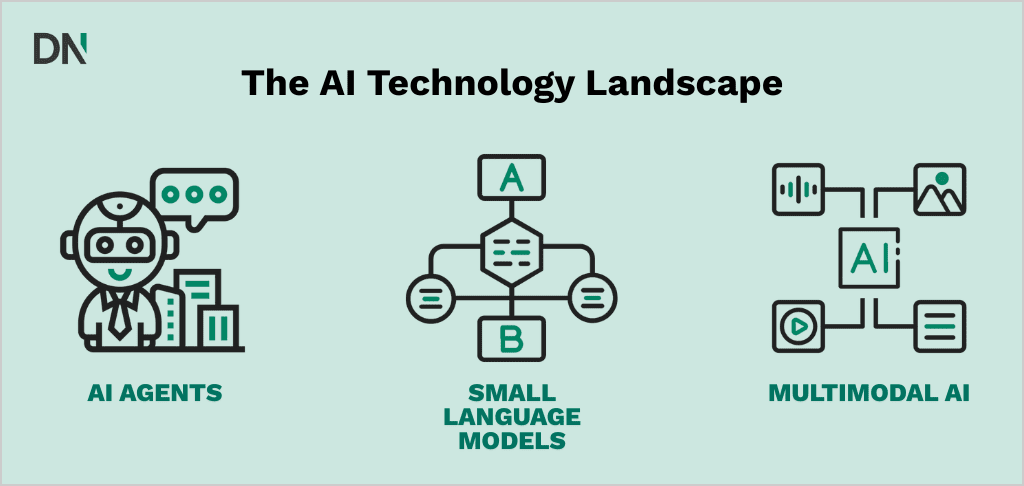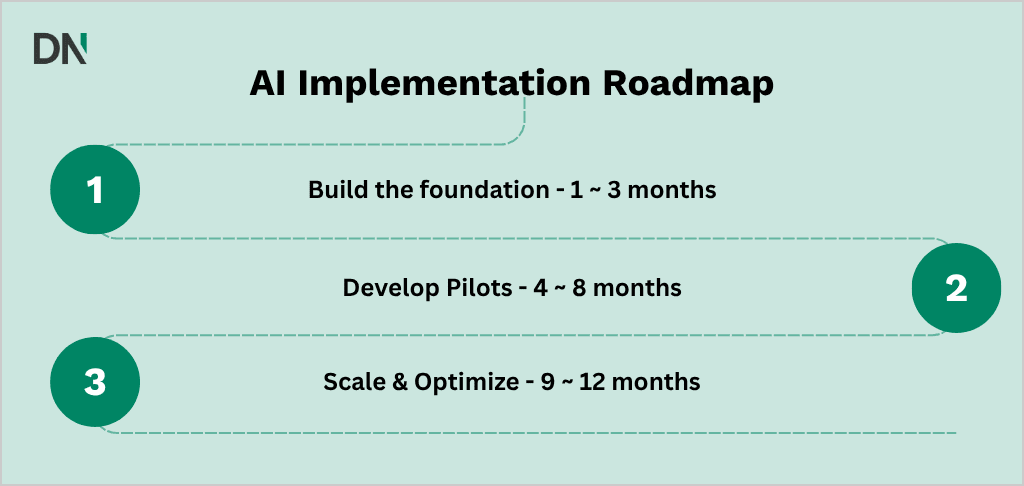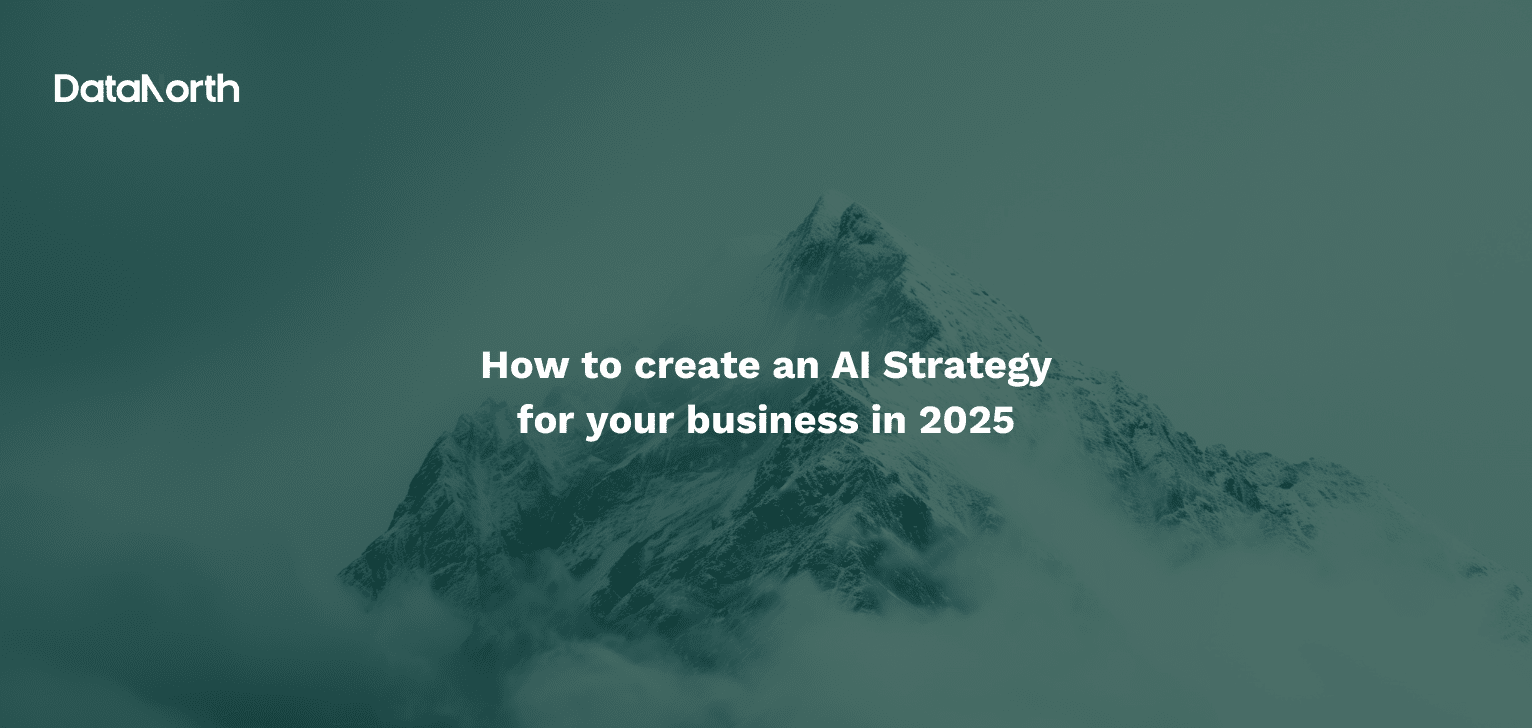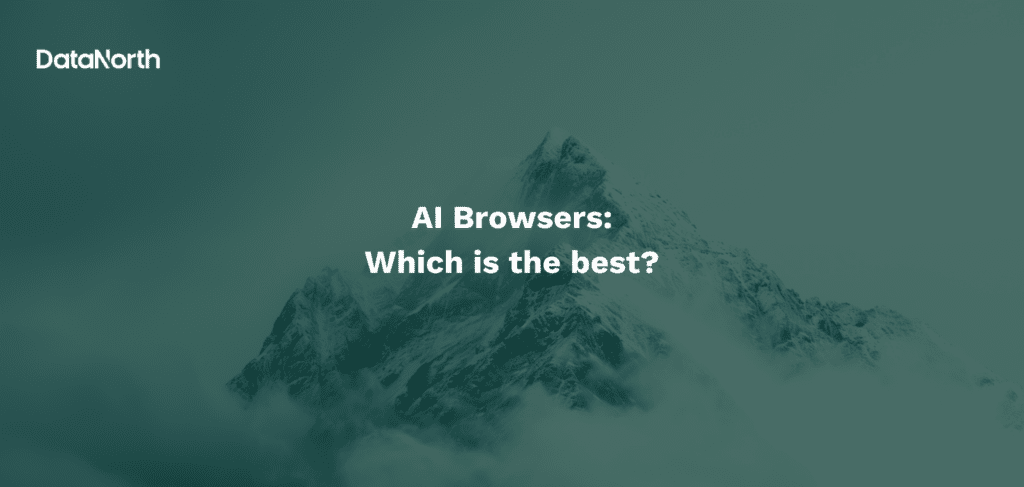The artificial intelligence landscape has evolved dramatically since 2024 when we first wrote this. What started with a period of experimentation and hype is transforming into a phase of realistic implementation and measurable business value. In 2025, AI is no longer just an option, it’s a strategic imperative. The way you approach AI determines your competitive advantage and long-term business success. So how do you set up an AI strategy for your business that will stand the test of time?
This comprehensive guide will walk you through creating a robust AI strategy that leverages the latest trends, technologies, and best practices for maximum impact.
We will showcase all the important steps in building a strong AI strategy for your organization. This is done with the best practices and common challenges that organizations face when creating an AI strategy.
AI in 2025: From experimenting to implementing
The year 2025 marks a decisive turning point in enterprise AI adoption. According to Techworld, recent industry surveys show that 89% of enterprises are actively advancing generative AI initiatives. This represents a seismic shift from just 16% in 2024. This dramatic increase reflects a fundamental change in how organizations approach AI. Companies have moved from asking “if” AI will transform business operations to “how fast” they can implement it to drive measurable value.
Key market dynamics shaping 2025
The global AI market is projected to reach $244.22 billion in 2025. By 2031 it is expected to grow to $1.01 trillion, representing a compound annual growth rate of 26.60%. This unprecedented investment is driven by several critical factors:
Strategic AI as a national priority: Nations now view AI capabilities as strategic resources and national security. In particular the prospect of artificial general intelligence (AGI). This governmental focus is accelerating innovation and regulatory frameworks globally.
Mainstream enterprise adoption: According to McKinsey, Over 75% of organizations now use AI in at least one business function, with 67% of global enterprises spending 10% or more of their digital budget on AI initiatives in 2024.
Proven ROI emergence: Companies are reporting tangible business value, with 78% of organizations reporting measurable business benefits from their AI investments.
The Evolving AI technology landscape

1. The rise of AI Agents and Autonomous Systems
Perhaps the most significant development in 2025 is the emergence of AI agents. An AI Agent is a system that doesn’t just understand and generate content but can take autonomous action. These Large Action Models (LAMs) represent a fundamental shift from traditional Large Language Models (LLMs). They are enabling AI to complete real-world tasks independently.
Current enterprise adoption shows that 56% of organizations already have AI agents in production or at scale. At the same time 31% are at the proof-of-concept stage. The most promising applications include:
- Customer Service Automation: AI agents can now handle up to 90% of customer inquiries autonomously
- Enterprise Process Automation: From booking travel to managing complex workflows, with 64% of AI agent adoption centered around business process automation
- Strategic Decision Support: AI agents that can analyze data and recommend strategic actions
2. The efficiency revolution: Small Language Models
A counter-trend to the “bigger is better” approach is gaining momentum with Small Language Models (SLMs). These models, typically using fewer than 10-15 billion parameters, offer several compelling advantages:
- Cost-effectiveness: Significantly lower operational costs compared to large models
- Privacy and security: Can run on-premises or on-device, reducing data exposure
- Specialized performance: Often outperform larger models on specific, well-defined tasks
- Sustainability: Dramatically reduced energy consumption and carbon footprint
Research by DHIWise indicates that for many agentic AI applications, SLMs are not only sufficient but inherently more suitable and economical. Organizations are increasingly adopting heterogeneous systems that combine different model sizes for optimal efficiency.
3. Multimodal AI integration
Modern AI systems are becoming truly multimodal, processing text, images, video, and audio simultaneously. This capability enables more sophisticated applications across industries:
- Retail: Combining shelf cameras, RFID data, and transaction records for inventory optimization, with multimodal AI leading to a 32% increase in customer engagement
- Finance: Integrating transaction logs, user patterns, and document analysis for enhanced fraud detection
- Healthcare: Merging patient data, medical imaging, and clinical notes for comprehensive diagnosis support, with multimodal AI systems achieving 95% accuracy in detecting early-stage cancers
Building your 2025 AI Strategy framework
Step 1: Strategic alignment and leadership commitment
CEO-level governance: Research by McKinsey shows that CEO oversight of AI governance is the element most correlated with higher self-reported bottom-line impact from AI initiatives. Only 28% of organizations currently have CEO-level AI governance, representing a significant opportunity for competitive advantage.
Define AI-first objectives: Move beyond digital transformation to AI-first operations. This means embedding intelligence across workflows, decisions, and customer experiences rather than treating AI as an add-on technology.
Step 2: Comprehensive AI readiness assessment
Data infrastructure evaluation: High-quality, accessible data remains the foundation of successful AI implementation. Organizations must assess their current data infrastructure and identify areas requiring improvement, particularly around data governance, security, and quality.
Technology stack modernization: Evaluate your current systems for AI-readiness, focusing on:
- Cloud infrastructure capabilities
- Edge computing requirements for real-time AI applications
- Integration capabilities with existing business systems
- Scalability to handle increasing AI workloads
Talent and skills gap analysis: With 74% of employers struggling to find qualified AI candidates, developing a comprehensive talent strategy is crucial. This includes both hiring AI specialists and upskilling existing employees, with 43% of companies planning to hire AI-related roles throughout 2025.
Step 3: Technology selection and architecture design
Model selection strategy: Choose the right AI models for your specific use cases:
- Large models for complex, general-purpose applications
- Small models for specialized, cost-sensitive, or edge computing scenarios
- Multimodal models for applications requiring diverse data type processing
Infrastructure architecture: Design scalable AI infrastructure that can adapt to changing needs:
- Hybrid cloud approaches for flexibility and cost optimization
- Edge computing for real-time applications and data privacy
- Specialized hardware (GPUs, TPUs, ASICs) for performance optimization
Step 4: Responsible AI and governance framework
The regulatory landscape has evolved significantly, with the EU AI Act taking effect and similar regulations emerging globally. Your AI strategy must include:
Ethical AI guidelines: Establish clear frameworks addressing:
- Bias detection and mitigation
- Transparency and explainability requirements
- Human oversight protocols
- Privacy protection measures
Risk management protocols: Implement comprehensive risk assessment processes covering technical, operational, reputational, and ethical challenges.
Compliance frameworks: Ensure alignment with emerging regulations including GDPR, EU AI Act, and industry-specific standards. Key 2025 compliance milestones include:
- February 2025: AI literacy and training obligations for employees
- August 2025: Full enforcement of penalties for breaches
Step 5: Sustainable AI practices
Sustainability has become a critical factor in AI strategy development. Organizations must consider:
Energy efficiency: Optimize AI models for reduced computational complexity and energy consumption. This includes:
- Using efficient algorithms and model compression techniques
- Implementing dynamic energy management systems
- Choosing renewable energy sources for AI infrastructure
Carbon footprint management: Track and minimize the environmental impact of AI systems through lifecycle assessment and optimization.
Implementation roadmap for 2025

Phase 1: Foundation building (Months 1-3)
- Establish AI governance structure with clear leadership accountability
- Conduct comprehensive readiness assessment covering data, technology, and talent
- Define initial use case portfolio focusing on high-impact, low-risk applications
- Set up data infrastructure and governance frameworks
Phase 2: Pilot development (Months 4-8)
- Launch strategic pilot projects with measurable success criteria
- Implement AI agent prototypes for customer service and process automation
- Establish monitoring and evaluation systems for continuous improvement
- Begin talent development programs for AI literacy across the organization
Phase 3: Scaling and optimization (Months 9-12)
- Scale successful pilots to full production deployment
- Implement advanced AI capabilities including multimodal and agentic systems
- Optimize for efficiency and sustainability through model compression and infrastructure tuning
- Establish continuous learning programs for ongoing AI capability development
Measuring AI success: Advanced ROI frameworks
Traditional ROI measurement approaches are insufficient for modern AI implementations. Organizations need comprehensive frameworks that capture both quantitative and qualitative benefits:
Financial metrics
- Direct ROI: Revenue increases and cost reductions from AI implementations.
- Productivity gains: Efficiency improvements in business processes.
- Time-to-market acceleration: Faster product and service development cycles.
Operational metrics
- Process optimization: Improvements in workflow efficiency and automation rates
- Quality enhancement: Reduction in errors and improvement in output quality
- Customer satisfaction: Enhanced customer experience and retention rates.
Strategic metrics
- Innovation capacity: New capabilities and business model opportunities
- Competitive advantage: Market position improvements and differentiation
- Adaptability: Organizational ability to respond to market changes
Future-proofing your AI strategy
As we look beyond 2025, several trends will continue shaping the AI landscape:
Continued efficiency improvements: The trend toward smaller, more efficient models will accelerate, driven by cost, sustainability, and accessibility concerns.
Agentic AI maturation: AI agents will become more autonomous and capable, with a survey by Cloudera showing that 57% of corporations are already working on building AI Agents.
Regulatory evolution: AI governance frameworks will continue evolving, requiring ongoing compliance strategy updates.
Sustainability imperatives: Environmental considerations will become increasingly central to AI strategy decisions.
Conclusion: Your AI strategy action plan
Creating a successful AI strategy for 2025 requires a comprehensive approach that balances innovation with responsible implementation. The key to success lies in:
- Starting with clear strategic alignment and strong leadership commitment
- Building robust foundations in data, technology, and talent
- Implementing iteratively with continuous learning and optimization
- Maintaining focus on efficiency and sustainability throughout the process
- Staying adaptable to the rapidly evolving AI landscape
Organizations that embrace this comprehensive approach to AI strategy will be well-positioned to capitalize on the transformative potential of AI while managing associated risks and challenges. The companies that act decisively in 2025 will establish competitive advantages that compound over time, making AI strategy development not just important but essential for long-term business success.
The future belongs to organizations that can successfully integrate AI into their core operations while maintaining ethical standards, operational efficiency, and sustainable practices. Your AI strategy for 2025 should be ambitious yet practical, innovative yet responsible, and most importantly, aligned with your organization’s unique goals and capabilities.





